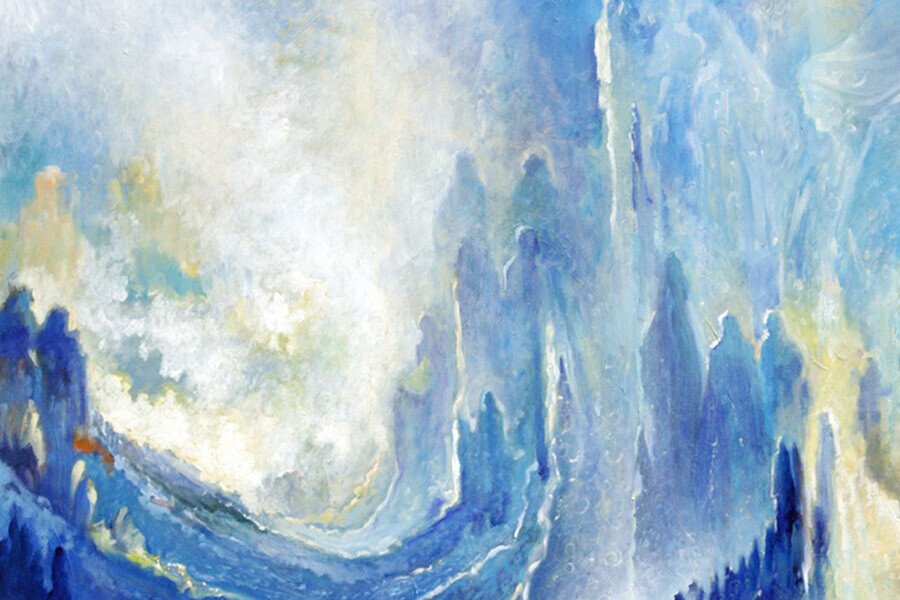The Metaphor of Deepavali
Deepavali, or Diwali as commonly known, will be celebrated on the 12th of November this year. What is the inner, or spiritual, significance of Diwali in Sanatan Dharma? An excerpt from Partho's latest book.

The first of our new series on the ancient wisdom of India, the origins of the Hindu dharma. The great Vedic Gods.
There are Four who are Beyond and they rule the mighty game of evolution. It is they who build the universe with their thoughts and imaginations. Vishnu or Virat put them in front each in turn, and they govern each a cycle. All the sons of immortality come forth from them and return to them, all the children of earth are their portions. One stands in front, the others incarnate to help him. They are God Himself in His fourfold manifestation. Once in each chaturyuga they come down together,— the chaturvyuha, Srikrishna, Balarama, Pradyumna, Aniruddha.
Sri Krishna contains all the others and puts them out from His being. He is Ishwara, Shiva, Brahma, Vishnu. Lordship is His manifestation, Might and Wisdom are His gunas. Balarama is the second Power. Force is His manifestation; strength and wrath are His attributes. Pradyumna is the third Power. Love is His manifestation; sweetness and delight are His attributes. Aniruddha is the fourth Power. Desire is His manifestation; bodily enjoyment and worldly reason are His attributes.
Sri Krishna is the Brahmin served by the Kshatriya. He has the divine knowledge and uses His might under the guidance of the Knowledge. Balarama is the Kshatriya. He allows Sri Krishna in Him to guide His strength and wrath, but He does not guide them Himself, He enjoys them. He is Rudra. Pradyumna is the Vaishya. He is for dana, prema, karuna. He gives Himself to men and buys their love in exchange. He is the universal philanthropist. He is the sweet and throbbing heart in things. Aniruddha is the Sudra. He is the kamin, the bhogin, the scientist, the user of material means, the democrat, the leveller.
The Satya is full of Sri Krishna; it is the golden Age when men are full of might and wisdom. The Treta is full of Balarama; the Chakravarti Raja is the incarnation of the Treta; it is full of great wars and mighty sacrifices. The Dwapara is full of Pradyumna; He prepares in the Dwapara the love which supports men through the Kali. Aniruddha, the Sudra, reigns in the Kali; He breaks the ancient moulds, He shatters to pieces the achar; He questions everything, destroys everything, levels everything, rebuilds everything. He is a Sudra and has the passion for work and service; He puts off lordship in order to become the divine Slave of humanity.
For each of Them is not simple in Himself, but contains the other three and their attributes; only His own are usually foremost. Each is not a part but God Himself in His fullness. They are not different, but the same, Four who are One, One who is Four. That one is Sri Krishna.
[ Some spellings have been altered – Ed.]
Excerpted from Sri Aurobindo’s The Harmony of Virtue: Early Cultural Writings
Seer, poet and writer, unarguably one of the profoundest influencers of human thought and civilization in the last century, Sri Aurobindo is widely known and revered as a Maharishi and Mahayogi. He left his body in Pondicherry on December 5, 1950.
Deepavali, or Diwali as commonly known, will be celebrated on the 12th of November this year. What is the inner, or spiritual, significance of Diwali in Sanatan Dharma? An excerpt from Partho's latest book.
The first of a four part series on Vedanta from Swami Vivekananda’s famous ‘Calcutta address on Vedanta’ delivered in Calcutta on January 19, 1897. This talk marks a significant moment in Swamiji’s life and is considered one of his most important speeches on Vedanta, where he explains some significant aspects of Sanatan Dharma
A series of conversations on Sanatan Dharma and Vedanta between our editors, Dr Singh and Partho. This is the first conversation in the series, describing the initial process of Vedanta

